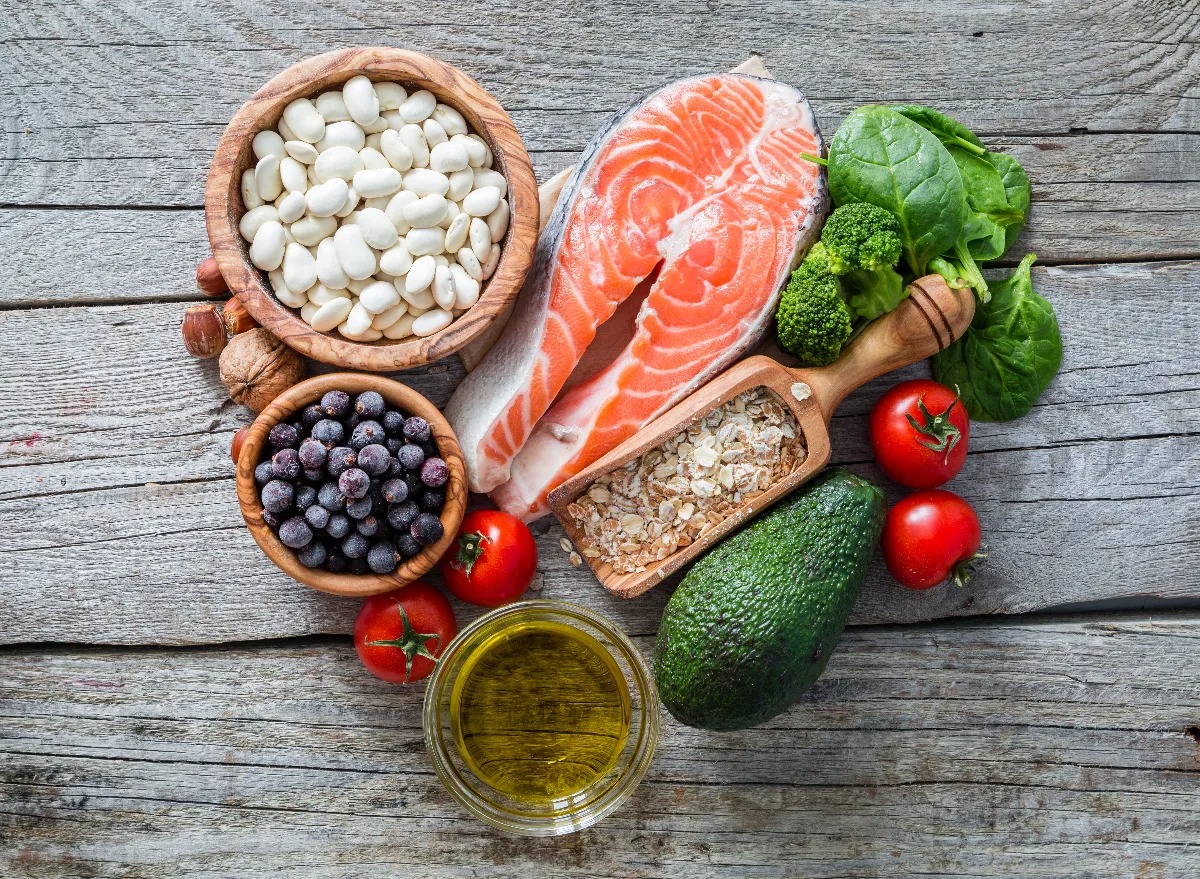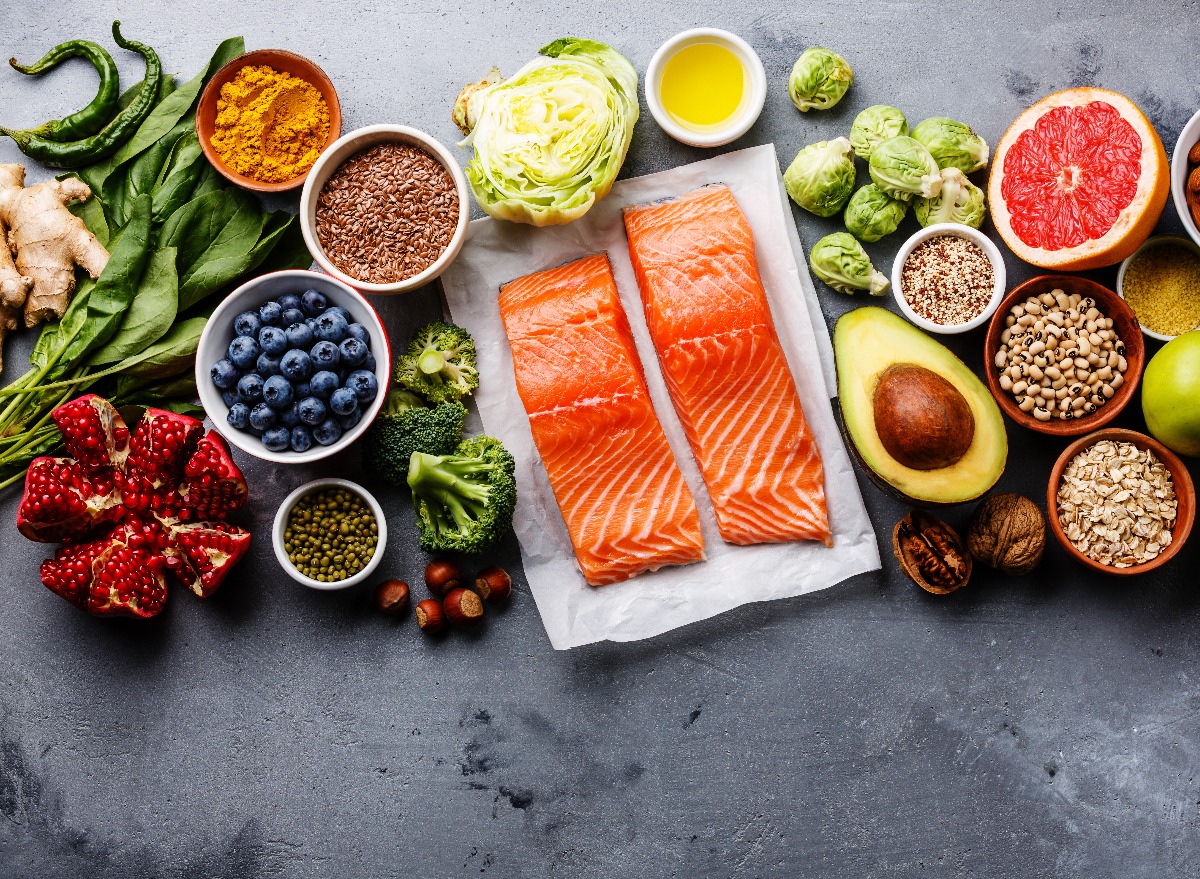

Featured
What Foods Are Good For Heart Health
Published: September 10, 2023
Discover the top featured foods for heart health and improve your overall well-being. Find out which nutrients are essential for a healthy heart and start incorporating them into your diet today.
Introduction:
When it comes to our overall well-being, keeping our hearts healthy is essential. The heart is a vital organ that pumps blood and oxygen throughout our bodies, allowing us to function properly. Unfortunately, heart disease remains one of the leading causes of death worldwide. The good news is that we have the power to prevent heart disease by making simple lifestyle changes, including adopting a heart-healthy diet.
A heart-healthy diet focuses on incorporating nutrient-rich foods that promote cardiovascular health. In this article, we will explore the important role of diet in maintaining a healthy heart and the key nutrients that contribute to heart health. We will also delve into specific foods that are beneficial for heart health, such as those rich in omega-3 fatty acids, fiber, antioxidants, and heart-healthy fats.
By understanding the impact of our dietary choices on heart health and making informed decisions, we can significantly reduce the risk of heart disease and improve our overall well-being.
Importance of Heart Health:
Our heart plays a crucial role in maintaining our overall health and well-being. It is responsible for pumping oxygen-rich blood to all parts of our body, supplying nutrients and removing waste products. Maintaining a healthy heart is essential for a long and active life.
Heart disease, also known as cardiovascular disease, refers to a range of conditions that affect the heart and the blood vessels. These conditions include coronary artery disease, heart failure, heart valve problems, and arrhythmias. Heart disease can lead to serious complications, such as heart attacks and strokes, and can significantly impact our quality of life.
Heart health is a matter of increasing concern globally. Sedentary lifestyles, poor dietary choices, smoking, and high-stress levels contribute to the rising incidence of heart disease. However, adopting a heart-healthy lifestyle can help prevent and manage heart disease.
Regular exercise, maintaining a healthy weight, and managing stress are integral components of heart health. But perhaps one of the most critical factors is our diet. A nutritious and balanced diet provides the necessary nutrients for optimal heart function and reduces the risk of developing heart disease.
By making smart food choices, we can enhance heart health and lower the risk of cardiovascular issues. It is important to understand that our dietary habits directly impact the health of our heart. By incorporating heart-healthy foods into our diet, we can promote healthy blood pressure, cholesterol levels, and overall cardiovascular well-being.
In the following sections, we will delve deeper into the role of diet in maintaining heart health and explore specific nutrients and foods that can positively impact cardiovascular function. By understanding the importance of heart health and the role of nutrition, we can empower ourselves to make informed decisions about our diet and take proactive steps towards a healthier heart.
Role of Diet in Heart Health:
The old saying, “You are what you eat,” holds true when it comes to heart health. Our diet plays a significant role in determining the health of our cardiovascular system. Numerous studies have shown a strong link between dietary patterns and the risk of heart disease. By adopting a heart-healthy diet, we can protect our hearts and lower the likelihood of developing heart-related issues.
One of the key factors in a heart-healthy diet is choosing nutrient-dense foods that provide essential vitamins, minerals, and antioxidants. These nutrients help maintain healthy blood pressure levels, reduce cholesterol, and prevent the formation of plaques in arteries.
Moreover, a heart-healthy diet focuses on limiting the consumption of foods high in saturated and trans fats, sodium, and added sugars. These components can increase inflammation, blood pressure, and cholesterol levels, leading to an increased risk of heart disease.
Beyond individual nutrients, the overall dietary pattern is crucial. The Mediterranean diet, for example, has been extensively studied and shown to have significant cardiovascular benefits. This eating pattern emphasizes fruits, vegetables, whole grains, legumes, and lean proteins like fish and poultry. It also includes healthy fats, such as olive oil and nuts, while limiting red meat and sweets.
Another important aspect of a heart-healthy diet is portion control. Overeating can contribute to weight gain, increase blood pressure, and raise cholesterol levels. Therefore, it is essential to listen to our body’s hunger and fullness cues and practice mindful eating.
Lastly, it is not just about what we eat but also about what we drink. Excessive alcohol consumption can raise blood pressure and contribute to heart disease. Therefore, it is recommended to drink alcohol in moderation, if at all. Hydration is also crucial for heart health, so staying adequately hydrated by drinking plenty of water is essential.
In summary, the role of diet in heart health cannot be overstated. By choosing nutrient-rich foods, following a balanced eating pattern, and practicing portion control, we can significantly reduce the risk of heart disease. In the following sections, we will explore specific nutrients and foods that are particularly beneficial for heart health, providing you with practical guidelines to incorporate into your diet.
Key Nutrients for a Healthy Heart:
When it comes to promoting heart health, certain nutrients play a crucial role in keeping our cardiovascular system functioning optimally. By incorporating these key nutrients into our diet, we can support heart health and reduce the risk of heart disease.
1. Omega-3 Fatty Acids: Omega-3 fatty acids are a type of healthy fat that has been extensively studied for its benefits to heart health. They have been found to lower triglyceride levels, reduce inflammation, and prevent the formation of blood clots. Fatty fish like salmon, mackerel, and sardines are excellent sources of omega-3 fatty acids. For those who don’t consume fish, sources like chia seeds, flaxseeds, and walnuts are great alternatives.
2. Fiber: Dietary fiber is essential for heart health as it helps lower cholesterol levels, regulate blood sugar levels, and maintain a healthy weight. Whole grains, fruits, vegetables, legumes, and nuts are all excellent sources of fiber. Incorporating these foods into our diet can help promote a healthy heart and improve overall digestive health.
3. Antioxidants: Antioxidants are powerful compounds that help protect the cells of our body, including those in our heart, from damage caused by free radicals. Berries, dark chocolate, nuts, and leafy green vegetables are rich in antioxidants and should be included in our diet regularly to support heart health.
4. Heart-Healthy Fats: Not all fats are created equal, and choosing the right types of fats is crucial for heart health. Monounsaturated and polyunsaturated fats, found in foods like avocados, olive oil, nuts, and seeds, can help lower bad cholesterol levels and reduce the risk of heart disease. It is important to moderate the consumption of saturated fats and avoid trans fats, which are found in processed and fried foods.
5. Low Sodium: Excessive sodium intake can contribute to high blood pressure, a major risk factor for heart disease. Limiting the consumption of processed and packaged foods, which are often high in sodium, can help maintain healthy blood pressure levels. Instead, season meals with herbs, spices, and other flavorings to reduce the reliance on salt.
Ensuring an adequate intake of these key nutrients through a varied and balanced diet is essential for promoting heart health. In the following sections, we will explore specific foods that are rich in these nutrients and provide practical tips on how to incorporate them into our daily meals.
Foods rich in Omega-3 Fatty Acids:
Omega-3 fatty acids are essential for heart health, as they have been shown to reduce inflammation, lower triglyceride levels, and decrease the risk of heart disease. Incorporating foods rich in omega-3 fatty acids into our diet is an excellent way to support cardiovascular well-being. Here are some top sources of omega-3 fatty acids:
- Fatty Fish: Fatty fish such as salmon, mackerel, tuna, and sardines are some of the best sources of omega-3 fatty acids. These fish are rich in EPA (eicosapentaenoic acid) and DHA (docosahexaenoic acid), both of which have been linked to improved heart health. Aim to include fatty fish in your diet at least twice a week for optimal omega-3 intake.
- Chia Seeds: Chia seeds are a plant-based source of omega-3 fatty acids. They are also rich in fiber, antioxidants, and other essential nutrients. Adding chia seeds to your yogurt, oatmeal, or smoothies can boost your omega-3 intake and contribute to heart health.
- Flaxseeds: Flaxseeds are another excellent plant-based source of omega-3 fatty acids. They are also high in fiber and lignans, which have been found to have potential heart-protective effects. Ground flaxseeds can easily be incorporated into baked goods, oatmeal, or smoothies to increase your omega-3 consumption.
- Walnuts: Walnuts are not only a tasty snack but also a great source of omega-3 fatty acids. They are also rich in antioxidants and can be added to salads, oatmeal, or used as a topping for yogurt for a heart-healthy boost.
- Soybeans: Soybeans and soy products, such as tofu and edamame, are rich in omega-3 fatty acids and are popular plant-based choices for those looking to increase their intake. Incorporate soy-based foods into your meals as a protein source to support heart health.
Incorporating these omega-3-rich foods into your diet can have significant benefits for heart health. Whether you prefer fatty fish, plant-based sources, or a combination of both, adding these foods to your meals can help you achieve the recommended intake of omega-3 fatty acids and support a healthy heart.
Foods high in Fiber:
Fiber plays a vital role in maintaining heart health by helping to lower cholesterol levels, regulate blood sugar, and promote a healthy weight. Incorporating foods high in fiber into our diet is an effective way to support cardiovascular well-being. Here are some top sources of dietary fiber that can benefit our heart:
- Whole Grains: Whole grains such as oats, quinoa, brown rice, and whole wheat bread are excellent sources of fiber. These grains contain the entire grain, including the bran, germ, and endosperm, providing a higher fiber content compared to refined grains. Swap refined grains for whole grains in your meals to increase your fiber intake and improve heart health.
- Fruits: Many fruits are rich in fiber, making them a healthy choice for supporting heart health. Apples, berries, oranges, pears, and bananas are examples of fruits that contain both soluble and insoluble fiber. Enjoy whole fruits as snacks or add them to your breakfast cereal, salads, or smoothies for a fiber boost.
- Vegetables: Vegetables are another great source of fiber that can benefit heart health. Leafy greens like spinach and kale, cruciferous vegetables like broccoli and cauliflower, and root vegetables like carrots and sweet potatoes are all fiber-rich options. Aim to incorporate a variety of vegetables into your meals to maximize your fiber intake.
- Legumes: Legumes, such as beans, lentils, and chickpeas, are not only a great plant-based protein source but also high in fiber. Adding legumes to your salads, soups, or stews can boost your fiber intake and promote heart health.
- Nuts and Seeds: Nuts and seeds, including almonds, walnuts, chia seeds, and flaxseeds, are not only rich in heart-healthy fats but also high in fiber. These nutrient-dense foods can be enjoyed as a snack or added to your yogurt, oatmeal, or salads for an extra fiber punch.
Incorporating these fiber-rich foods into your daily meals can help improve digestion, promote a feeling of fullness, and support heart health. Aim to consume a variety of fruits, vegetables, whole grains, legumes, nuts, and seeds to ensure an adequate intake of fiber in your diet.
Foods rich in Antioxidants:
Antioxidants are powerful compounds that help protect our cells from damage caused by free radicals. They play a crucial role in maintaining heart health by reducing inflammation and oxidative stress. Incorporating foods rich in antioxidants into our diet is an effective way to support cardiovascular well-being. Here are some top food sources of antioxidants:
- Berries: Berries such as blueberries, strawberries, raspberries, and blackberries are packed with antioxidants. These vibrant fruits are not only delicious but also provide a wide range of antioxidants, including anthocyanins, which have been linked to heart health benefits. Enjoy berries as a snack, sprinkle them on top of your yogurt or oatmeal, or blend them into a smoothie for a nutritious and antioxidant-rich treat.
- Dark Chocolate: Good news for chocolate lovers – dark chocolate is rich in antioxidants, particularly flavonoids. Flavonoids have been shown to have positive effects on heart health, including improving blood flow and reducing the risk of blood clots. Choose dark chocolate with a high percentage of cocoa (70% or more) and enjoy it in moderation as a tasty treat.
- Nuts: Nuts such as almonds, walnuts, and pistachios are not only a great source of heart-healthy fats but also contain antioxidants, including vitamin E. Snack on a handful of mixed nuts, add them to your salads or homemade trail mix for a crunchier and nutrient-rich option.
- Leafy Green Vegetables: Leafy greens like spinach, kale, and Swiss chard are rich in antioxidants, including vitamins A, C, and K. These vegetables also provide other heart-healthy nutrients, such as fiber and folate. Incorporate leafy greens into your salads, stir-fries, or smoothies for a boost of antioxidants and overall nutritional value.
- Red Wine: Red wine, when consumed in moderation, can provide antioxidant benefits due to its high content of resveratrol. Resveratrol has been associated with heart health benefits, including improving blood flow and reducing the risk of blood clots. Enjoy a glass of red wine occasionally, but remember moderation is key.
Incorporating these antioxidant-rich foods into your diet can have a positive impact on heart health. Remember to consume a varied diet, including a wide range of fruits, vegetables, nuts, and dark chocolate, to benefit from the diverse array of antioxidants they provide.
Foods with Heart-Healthy Fats:
Not all fats are created equal, and choosing the right types of fats is crucial for maintaining heart health. Including foods with heart-healthy fats in our diet can help lower bad cholesterol levels, reduce inflammation, and support cardiovascular well-being. Here are some top food sources of heart-healthy fats:
- Avocados: Avocados are a rich source of monounsaturated fats, which have been shown to improve heart health. These creamy fruits are also packed with fiber, vitamins, and minerals. Enjoy avocado slices in sandwiches and salads or mash them up to make guacamole.
- Olive Oil: Olive oil is a staple of the Mediterranean diet and is widely recognized for its heart-healthy benefits. It contains monounsaturated fats and antioxidants, which can help lower LDL (bad) cholesterol levels. Use olive oil as a dressing for salads, a dip for bread, or for cooking and sautéing vegetables.
- Nuts and Seeds: Nuts and seeds are not only a great source of plant-based protein and fiber but also provide heart-healthy fats. Almonds, walnuts, chia seeds, and flaxseeds are excellent examples. Snack on a handful of nuts, sprinkle them on top of your yogurt or cereal, or add them to your baking recipes for a nutritious boost.
- Fatty Fish: Fatty fish, such as salmon, mackerel, and trout, are rich in omega-3 fatty acids, which have been shown to support heart health. These fatty acids can help reduce inflammation, lower triglyceride levels, and decrease the risk of heart disease. Include fatty fish in your diet at least twice a week for optimal omega-3 intake.
- Coconut Oil: While coconut oil is high in saturated fat, it contains medium-chain triglycerides (MCTs) that have been associated with potential health benefits, including raising HDL (good) cholesterol levels. However, moderation is key due to its high calorie density. Use coconut oil in moderation for cooking, baking, or in smoothies.
Incorporating these heart-healthy fats into your diet can help support cardiovascular health and overall well-being. Remember to consume fats in moderation, as they are calorie-dense. Aim to incorporate a variety of these foods into your meals for a good balance of nutrients and fats.
Foods low in Sodium:
Sodium is an essential mineral that our bodies need in small amounts. However, consuming excessive amounts of sodium can lead to high blood pressure, a major risk factor for heart disease. Reducing sodium intake is crucial for maintaining heart health. By incorporating foods low in sodium into our diet, we can support cardiovascular well-being. Here are some top food choices that are naturally low in sodium:
- Fresh Fruits and Vegetables: Fruits and vegetables, in their fresh and unprocessed form, are naturally low in sodium. These nutrient-dense foods not only provide essential vitamins, minerals, and fiber but also add flavor and variety to our meals. Aim to incorporate a colorful assortment of fruits and vegetables into your daily meals to support heart health.
- Lean Proteins: Opt for lean protein sources such as skinless poultry, fish, beans, lentils, and tofu. These proteins are lower in sodium compared to processed meats like bacon, sausages, and deli meats. Incorporate lean proteins into your meals to support heart health without increasing your sodium intake.
- Whole Grains: Choose whole grains like brown rice, quinoa, oats, and whole wheat bread or pasta. These options are lower in sodium compared to their processed counterparts. They are also rich in fiber, vitamins, and minerals, making them a healthier choice overall for heart health.
- Herbs and Spices: Enhance the flavor of your dishes with herbs and spices instead of relying on salt. Fresh or dried herbs like basil, thyme, rosemary, and spices such as turmeric, cumin, and paprika can add depth and taste to your meals without significantly increasing sodium levels.
- Homemade Meals: Preparing meals at home gives you better control over the amount of sodium that goes into your food. Cooking from scratch allows you to choose fresh ingredients, limit added salt, and experiment with other flavorful ingredients. Use herbs, spices, citrus juices, or vinegar to enhance the taste of your dishes instead of relying on excessive sodium.
By incorporating these foods low in sodium into your diet, you can help reduce your sodium intake and promote heart health. Be mindful of reading food labels and choosing low-sodium or no-added-salt options when shopping for packaged and processed foods. Making small changes in your food choices can have a big impact on maintaining healthy blood pressure levels and reducing the risk of heart disease.
Foods low in Trans fats:
Trans fats are a type of unhealthy fat that has been strongly linked to an increased risk of heart disease. Consuming foods high in trans fats can raise LDL (bad) cholesterol levels and lower HDL (good) cholesterol levels, leading to a higher risk of cardiovascular problems. It is important to choose foods that are low in trans fats to protect our heart health. Here are some food choices that are naturally low in trans fats:
- Fruits and Vegetables: Fresh fruits and vegetables are naturally trans-fat-free and provide essential nutrients, fiber, and antioxidants. Incorporating a variety of colorful fruits and vegetables into your diet can offer numerous health benefits, including supporting heart health.
- Lean Proteins: Opt for lean sources of protein, such as skinless poultry, fish, legumes, tofu, and low-fat dairy products. These options are typically low in trans fats, making them healthier choices for your heart. Including these protein sources in your meals can help maintain muscle mass and support overall cardiovascular well-being.
- Whole Grains: Choose whole grain products like whole wheat bread, brown rice, quinoa, and whole grain cereals. These foods are typically low in trans fats and high in fiber, which is beneficial for heart health. Whole grains provide sustained energy and help regulate blood sugar levels.
- Nuts and Seeds: Nuts and seeds are not only rich in heart-healthy fats but also low in trans fats. Almonds, walnuts, flaxseeds, and chia seeds are great options to include in your diet. They provide nutrients, fiber, and satiety, making them a healthy snack or addition to meals.
- Plant-Based Oils: Substitute trans fat-containing oils, such as partially hydrogenated oils, with healthier options like olive oil, canola oil, and avocado oil. These oils contain monounsaturated and polyunsaturated fats that are beneficial for heart health. Use them in moderation when cooking or dressing your meals.
By choosing foods low in trans fats, you can support your heart health and reduce the risk of cardiovascular problems. It is also important to read food labels carefully and avoid processed and fried foods that may contain hidden trans fats. Making conscious choices to include healthier options in your diet can have a positive impact on your overall well-being.
Conclusion:
Taking care of our hearts is a crucial aspect of maintaining overall well-being. By adopting a heart-healthy diet, we can significantly reduce the risk of heart disease and promote cardiovascular wellness. Throughout this article, we have explored the importance of heart health, the role of diet in maintaining a healthy heart, and key nutrients and foods that contribute to heart health.
From incorporating foods rich in omega-3 fatty acids, fiber, antioxidants, and heart-healthy fats to choosing foods low in sodium and trans fats, there are numerous options to support our hearts through our daily food choices. By focusing on nutrient-dense foods, we can provide our bodies with the essential vitamins, minerals, and antioxidants needed to optimize heart function and reduce the risk of heart disease.
It is important to remember that achieving and maintaining heart health is a holistic journey that encompasses various factors, including regular physical activity, managing stress levels, and avoiding harmful habits such as smoking. However, diet plays a central role in supporting cardiovascular wellness and should be a priority in our daily lives.
By making smart food choices, being mindful of portion sizes, and incorporating a variety of heart-healthy foods into our meals, we can take proactive steps towards maintaining a healthy heart. Remember to consult with a healthcare professional or registered dietitian for personalized guidance and recommendations.
Investing in our heart health today will pay dividends in the future. Let’s embrace a heart-healthy lifestyle and enjoy the benefits of a strong and vibrant heart for years to come.









